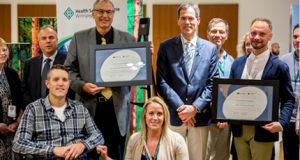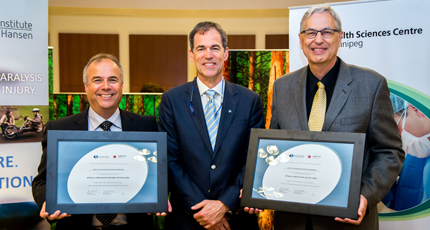Above: WRHA chief operating officer Real Cloutier (from left), Rick Hansen Institute chief executive officer Bill Barrable and Health Sciences Centre Winnipeg chief operating officer Dana Erickson with the accreditation awards.
(Reposted from WRHA Health Info News Aug. 10, 2016.)
Region gets top marks for Spinal Cord Injury Program
BY SUSIE STRACHAN
Winnipeg Regional Health Authority
Published Wednesday, August 10, 2016
Shane Hartje knows first-hand about the level of care provided by the Winnipeg Regional Health Authority’s Spinal Cord Injury Program at Health Sciences Centre Winnipeg.
The Winnipeg man injured his spine in an accident while riding his motorcycle at Morden’s Shadow Valley track a little over two months ago.
Since then he has undergone surgery and rehabilitation. And although he remains in a wheelchair, he continues to make progress, thanks to the care he has received.
“The hospital has become my safe place, where people are dedicated to helping me improve, from stage to stage,” said Hartje. “I know I’ve still got a long way to go, but hey, they have me popping wheelies now.”
It is because of the care the Spinal Cord Injury (SCI) Program provides to patients like Hartje that it has become one of the first in Canada to be accredited according to standards developed by the Rick Hansen Institute (RHI) and Accreditation Canada.
At an event at HSC today, RHI Chief Executive Officer Bill Barrable presented the SCI team with two certificates in acknowledgement of this achievement.
“The program is the first to be accredited on both the acute care and the rehabilitation sides,” said Barrable. “It shows in the quality of people who co-ordinate the care for their patients, people who overcome obstacles within the system in order to ensure the best possible outcomes for their patients.”

Shane Hartje (front left) along with Real Cloutier (back, from left), Dana Erickson, Bill Barrable, Dr. Alan Casey and other members of the acute and rehab spinal cord injury teams at Health Sciences Centre Winnipeg.
The WRHA-wide accreditation in the spring of 2016 is the first time the Manitoba program has been reviewed under comprehensive standards for spinal cord injury care. HSC Winnipeg’s rehab SCI program scored 100 per cent, and the acute SCI program scored 99 per cent.
HSC is part of a national and international network of hospitals working with spinal cord injury patients. “There are 31 hospitals across Canada, along with a number internationally which are using the standards on both patient care and in research,” said Barrable.
“I am pleased to congratulate the WRHA and HSC Winnipeg on demonstrating leadership by being early adopters of SCI-specific standards, and providing excellent and reliable SCI care in Canada,” he added.
As the provincial trauma and major health-care referral centre for Manitoba and northwestern Ontario, HSC’s interdisciplinary team provides specialized trauma, orthopedic and neurologic surgical acute care, along with sub-acute rehabilitative care, including physical medicine and rehabilitation, physiotherapy, occupational therapy, social work and recreation therapy for approximately 50 to 60 people with spinal cord injuries each year. The team also treats older patients with arthritis-related injuries which are due to falling.
Given the nature of spinal cord injuries – whether a result of trauma, aging, or illness – patients can spend months in a hospital pursuing intensive therapies to build function and independence, followed by lifelong outpatient care.
“Our job is to improve the lives of someone who has had a spinal cord injury,” said Dr. Alan Casey, with the rehab SCI program. “It’s wonderful to receive this recognition of our work. Of course, we still feel there are ways to improve upon this, and we’re very happy to be working on that with our various partners, including the Rick Hansen Institute, the Spinal Cord Research Centre at the University of Manitoba and the Canadian Paraplegic Association of Manitoba.”
Manitoba’s SCI program is nationally recognized for clinical research excellence in areas such as symptomatic management and secondary prevention of comorbidities, including virtual SWAT (skin wound assessment team) clinics for management of pressure ulcers, and medication interventions for spasticity, neurogenic bladder and bowel management.
Real Cloutier, Chief Operating Officer of the Winnipeg Regional Health Authority, congratulated the SCI program on the awards. “Access to specialized staff, tools and resources make an enormous difference in quality of life,” said Cloutier.
About Rick Hansen Institute
Established in 2007, the Rick Hansen Institute is a Canadian-based not-for-profit organization committed to accelerating the translation of discoveries and best practices into improved treatments for people with spinal cord injuries. For more information, visit www.rickhanseninstitute.org.
About Accreditation Canada
Accreditation Canada is an independent, not-for-profit organization that has been improving health quality through accreditation since 1958. They accredit more than 1,200 organizations representing 5,700 sites and services across Canada. These are the organizations you count on to provide safe, quality health care – hospitals, walk-in clinics and labs, emergency medical services, long-term care homes, home care services, mental health services, and community health programs, among others. They also accredit provincial health authorities and health systems. For more information, visit Accreditation Canada.
About Winnipeg Regional Health Authority
The Winnipeg Regional Health Authority (WRHA) is one of the largest and most diverse health regions in Canada. WRHA provides health care to more than 700,000 people living in Winnipeg and Churchill, as well as support and specialty referral services to approximately 500,000 Manitobans outside Winnipeg, and residents of northwestern Ontario and Nunavut. With an annual operating budget of nearly $2.9 billion, the WRHA operates or funds over 200 health service facilities and programs which employ approximately 28,000 people across the Region.
About HSC Winnipeg
HSC Winnipeg’s vision is Patients First. They provide the best possible hospital experience for patients and families, and create a positive working and learning environment for staff, volunteers and future healthcare providers. As Manitoba’s largest healthcare facility, they provide acute hospital (tertiary and other) and community health services to Manitobans and others. They provide specialty, subspecialty and sophisticated intensive care in a learning environment, and are Manitoba’s centre for trauma, burns, neurosciences, and most hospital-based pediatric care. For more information, visit www.hsc.mb.ca
